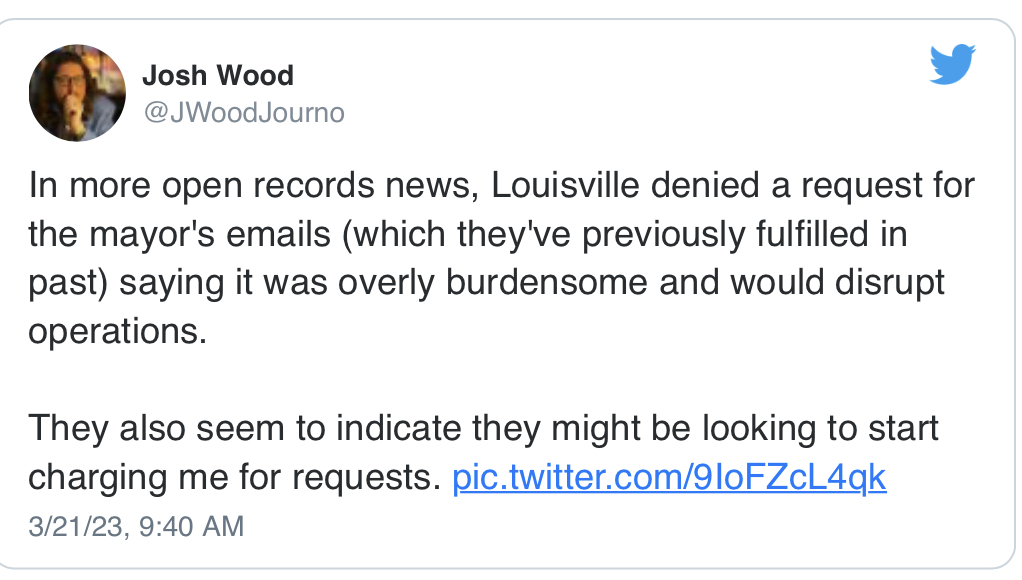
Rookie mistake or an end to the era of good feeling?
In the early days of the Greenberg administration, LEO Weekly's Josh Wood obtained emails exchanged by the new mayor, his staff, and others — through the open records law — using them in writing two insightful stories about new team.
But a recent response to a similar request, for a different timeframe, prompts concerns.
Wood tweets that he was directed to “limit the key words and phrases and thereby make [the request] less burdensome to the functions of the department.” He was advised that Louisville Metro would then “reconsider” his request and “recalculate the corresponding cost.”
In July, 2022, the Franklin Circuit Court rejected the argument that a requester is obligated to limit (or even provide) "key words and phrases (search terms) in a case pitting American Oversight against the Office of the Kentucky Attorney General.
https://www.documentcloud.org/documents/22087464-20220714-opinion-and-o…
https://kyopengov.org/blog/franklin-circuit-courts-july-14-opinion-majo…
The court determined that open records requesters:
“cannot be expected to know all relevant search terms or places where the agency may file such records. To place that burden on the requestor is to invite the agency to hide relevant records that are obscurely labeled or stored in deep recesses of its bureaucratic records system. It is the duty of the agency to conduct and open, thorough, and good faith search of its records in response to an Open Records request.”
The circuit court established the parameters of an adequate search for public records, placing the burden squarely on the shoulders of the public agency — where it belongs — and lifting it from the shoulders of the open records requester. The latter can no more exhaustively identify all possible search terms that will yield all electronically stored responsive records than s/he can identify the designation on the tab(s) of hard copy file(s) stored in old school filing cabinet(s) that will yield all responsive paper records.
The requester cannot be “expected to request blindly, yet with particularity, documents from a file that he had never seen.”
https://caselaw.findlaw.com/ky-supreme-court/1387319.html
It is not incumbent on Wood to "limit keywords and phrase." Based on our discussion of the number of records that Louisville asserts his requests implicates, the asserted burden appears to be exaggerated.
Nevertheless, Wood is aware that he risks denial of his request based on its purported burdensomeness. His recourse, then, rests in the Office of the Attorney General or the Jefferson Circuit Court.
Having prevailed over the previous administration in an open records appeal, he is no stranger to this process.
https://www.ag.ky.gov/Resources/orom/2022/22-ORD-268.pdf
One thing is abundantly clear. Louisville cannot "recalculate the corresponding cost" of producing public records responsive to Wood's request based on research or staff time associated with locating those records. Nor can it condition records access to his agreement to "limit" his request.
By law, Louisville may only recover its "actual cost of reproduction, including the costs of the media and any mechanical processing cost incurred by the public agency, but not including the cost of staff required."
https://apps.legislature.ky.gov/law/statutes/statute.aspx?id=23061
(Section(3))
Since the requested emails originate in an electronic format, and can be transmitted in an electronic format, there is no "actual cost of production." Any costs incurred in redacting the emails must be absorbed by Louisville.
https://apps.legislature.ky.gov/law/statutes/statute.aspx?id=23061
(Section (2)(a))
https://apps.legislature.ky.gov/law/statutes/statute.aspx?id=23061
(Section (4))
It appears, therefore, that the Greenberg administration made a "rookie mistake," that Wood has worn out his welcome, or that the Greenberg open records honeymoon is over before it really began.


